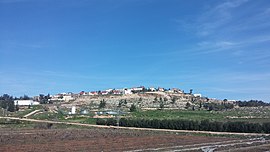Shiloh (settlement)
|
Shiloh שילה |
||
 Shiloh viewed from the southwest |
||
| Territory : |
West Bank ( Judea and Samaria ) |
|
| Regional administration : | Mateh Benjamin | |
| Founded : | 1978 | |
| Coordinates : | 32 ° 3 ' N , 35 ° 18' E | |
| Residents : | 3,988 (2017) | |
|
|
||
Shiloh ( Hebrew שילה) is an Israeli settlement in the northern West Bank . The settlement was founded in 1978 and belongs to the Mateh Benjamin regional administration .
The international community, like all Israeli settlements in the territories occupied since 1967, regards Shiloh as illegal under international law. Israel denies this.
location
Shiloh is located east of the Israeli barrier in the northern West Bank, around 30 kilometers north of Jerusalem and 18 kilometers south of Nablus . The settlement is near Highway 60 , which crosses the West Bank in a north-south direction. With the settlements of Shvut Rachel , Amichai , Eli and Ma'ale Levona as well as several small outposts east of Amichai, Shiloh forms an Israeli settlement block in the center of the northern West Bank. Shiloh on the south by the Palestinian village of Turmus Aya and in the north on Qaryut .
Shiloh is the excavation site of the biblical place Shiloh , which was of great importance to the Israelites around 3000 years ago .
Land question
Shiloh was built on land, which, according to the Palestinian NGO Applied Research Institute - Jerusalem (ARIJ) , was confiscated from the neighboring villages of Turmus Aya and Qaryut.
The ownership claims to the land on which Shiloh was built are controversial. According to the Israeli government , the land is state land , i.e. land that belonged to the Jordanian government before the Six Day War or was left behind by Palestinians who fled the war. The Israeli NGO Peace Now and Palestinian residents say, however, that at least a quarter of the settlement was built on privately owned land, which would also be illegal under Israeli law.
Individual evidence
- ↑ Turmus'ayya Town profiles. P. 17 , accessed on July 16, 2019 (English).
- ↑ Qaryut Village profiles. P. 17 , accessed on July 16, 2019 (English).
- ^ Six Day War: Land Ownership Disputes Arise. Retrieved July 16, 2019 .
